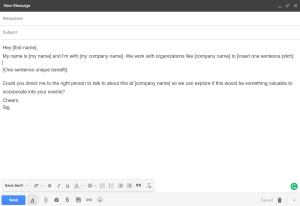
On 22 October, Facebook revamped its search console by indexing all 2 trillion public posts.
The goal? To improve the results of 1.5 billion searches conducted on the site every day.
The update appears to be the latest effort by Facebook to keep people on the site when they want to discover and engage with news and current events, rather than switching to Google or Twitter.
Trending towards global and local events
With 1.55 billion active monthly users, there is no shortage of posts about current events.
This update, called Search FYI, tries to take advantage of this resource to increase sharing and keep people on the site for longer. As Facebook’s VP of Search Tom Stockey told TechCrunch, “more access to this content will cause people to share more of it.”

When users start typing, the search box will autocomplete with personalized suggestions to include popular stories that are unfolding. This will now include recent, relevant public posts along with posts from the user’s friends. Public posts around a particular link will show popular quotes from the posts, along with an overview of sentiment.
Another piece of the puzzle
This is not Facebook’s first foray into becoming the place to go for breaking news. Back in January the network introduced Trending, a Twitter-esque feature that highlights popular real-time news stories, curated to a user’s interests.

It is interesting to note that Facebook-owned Instagram has recently had an update which serves a somewhat similar function. The Explore page now shows trends as they emerge in real-time, highlighting events and conversations both globally and locally.
September saw an update for Facebook Notes, the underused format for publishing longer form posts. With header images, richer text formats and resizable, captionable photos, Notes now acts like a mini blogging platform within Facebook. When viewed in combination with the public nature of Search FYI, it seems to be another attempt to create more and different types of content on the site, and to make that content readily accessible.
There has also been an update for Notifications in the mobile app, meaning users that enable their location history will be shown local news and events. Nearby places to eat will also show up, along with a link to their Facebook page and reviews.
All of these changes are based around making Facebook a site that users never need to leave. From cute cat photos to long-form journalism, and local events to worldwide news, Facebook wants to be the place you can access it all. By making it easier to find and share these stories, they will probably at least succeed in increasing the amount of content that is shared and engaged with.
A fresh opportunity for marketers?
While a lot is still unknown about how this will impact on brand’s marketing, it seems probable that it will change the visibility of certain content.
Exactly how remains to be seen, but it does seem likely that a good quality, highly engaged post would be returned in the search results, whether it comes from a brand or not.
Search FYI will, therefore, provide Facebook users with a new way to discover content, which means marketers have a new way to reach consumers who have not previously liked or followed them.
This could see brands using Search FYI to build their audience on Facebook, and it could also become an important new source of referral traffic to external websites.
Or a fresh revenue stream for Facebook?
Whether this is a brave new Facebook world for marketers or not depends mainly on Facebook’s algorithm. The site may chose to limit the amount of branded content that search will return.
This seems likely in the longer term, if we consider the changes Facebook made to the Newsfeed in November 2014 that drastically reduced the organic reach of all Pages. This was seen by many as a way of forcing brands into paying for promoted content to ensure they reached their audience.
Furthermore, Google has shown the way to monetize search and it’s inherent intent, which is a revenue stream Facebook will surely embrace at some point. While the focus is not currently on monetization, it seems its introduction is only a matter of time. Tom Stockey recently explained to TechCrunch that “because the business model for search is so well understood, we know it will come when it makes sense”
How do you adapt your content?
Content will have to adapt to these changes, even though it will take time to discover best practice. If search is to become a new way to reach out to consumers, content will need to be search friendly as well as social friendly.
While shareability will still be an important factor in getting content seen, ignoring SEO can now damage the reach potential of some otherwise excellent content. Content now needs to target those who have previously expressed an interest in the topic as well as those who happened to have searched for that topic.
Previous changes to the News Feed algorithm has meant that content which is explicitly selling products or pushing promotions without context are less likely to appear on a News Feed. This new update reinforces that rule, as content needs to be engaged with for Facebook to know it is current and interesting enough to show up in the search results.
Finally, there is, of course, an element of the unknown. Trial and error will play a large part in discovering what works and what doesn’t. And in all likelihood once marketers have started to work out how to pitch their content for search, the algorithm will change again or paid search will be introduced. Until it does, the window is open…jump through it.
Digital & Social Articles on Business 2 Community(139)
Report Post









